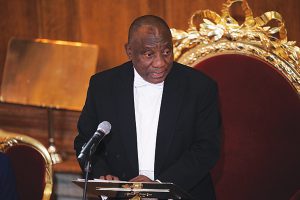Bloomberg
South African President Cyril Ramaphosa emerged from a ruling party electoral conference with a stronger mandate, yet still has to overcome a series of political hurdles to tackle a daunting economic to-do list.
The country is gripped by an energy crisis that’s idling businesses for six or more hours a day, the crumbling freight-rail system prevents key exports from getting to ports and municipalities struggle to provide basic services.
The malaise has undermined support for the African National Congress (ANC) to such an extent that it risks losing its majority in 2024 elections and being forced into a coalition that could be a further brake on government decisiveness.
With Ramaphosa now beholden to cabinet ministers who’ve backed him but struggled to do their day jobs, analysts and business leaders are skeptical he’ll break with his cautious style and take the bold action the economy needs or cut the dead wood from his cabinet.
Continuing divisions in the ANC do “not bode well for ongoing economic reform and policy certainty,†said Cas Coovadia, chief executive officer of Business Unity South Africa, the country’s biggest business organisation. “The president needs to put national interest above
the ongoing factional battles in the ANC.â€
While Ramaphosa, who took control of the party in 2017 by a slender margin, garnered almost 60% of the vote this time around, a late surge in support for his rival, former Health Minister Zweli Mkhize, laid bare the extent of ongoing internal opposition to his rule.
The president’s opening address to the conference on the outskirts of Johannesburg was repeatedly interrupted by delegates from the KwaZulu-Natal province, home to his predecessor and political nemesis Jacob Zuma. They demanded his resignation over a scandal surrounding the theft of foreign currency from his Phala Phala game farm in the northern Limpopo province in 2020.
And while his allies secured four of the other top six party posts, they lost out in the race for the No. 2 job, which went to Paul Mashatile, the ANC’s outgoing treasurer-general.
The five-day gathering was adjourned until January 5, when the party’s policy pronouncements will be announced.
Gwede Mantashe, who was re-elected as ANC chairman, played a key role in shoring up support for Ramaphosa, but as energy minister he has actively frustrated the president’s attempts to transition the economy to green energy. Still, given the alternative, South Africa’s currency and government bonds surged on news of Ramaphosa’s re-election, although it’s unclear how long the up-tick in investor confidence will last.
Even Ramaphosa’s drive to break with Zuma’s scandal-ridden era has now been complicated by his own legal travails, with the police, central bank and tax agency still investigating whether his handling of the farm robbery violated any laws.
Ramaphosa acknowledged that failing government services had eroded confidence in the ANC and that his administration must do more to stamp out graft, bridge the gap between rich and poor and redistribute land.
 The Gulf Time Newspaper One of the finest business newspapers in the UAE brought to you by our professional writers and editors.
The Gulf Time Newspaper One of the finest business newspapers in the UAE brought to you by our professional writers and editors.
